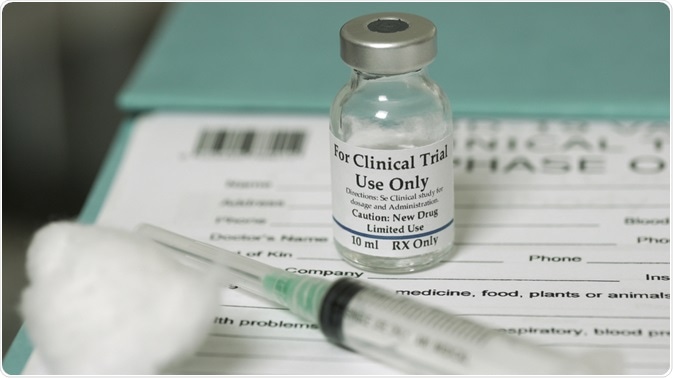Clinical trials are a vital stage of the drug development process where new, candidate drugs are tested on a human population to determine their safety and efficacy. Clinical trials can only occur once they have demonstrated sufficient safety and efficacy in pre-clinical trials, where the new therapeutics are tested either in vivo in animal models or in vitro using cell cultures. Clinical trials have five phases, from 0 to 5. Here we discuss each phase, describing what occurs in each phase and how many people are tested.

Clinical Trial. Image Credit: Scott Cornell/Shutterstock.com
Phase 0 trials
Phase 0 trials are the first clinical trials to test a candidate drug in human volunteers. For this reason, just a few participants take part in phase 0 trials to limit the impact of potentially harmful side effects.
While pre-clinical trials establish the safety profiles of candidate drugs, they are not able to predict the full scope of potential adverse effects as drugs can affect the human body differently as opposed to animal models and the behavior of human cells isolated in a cell culture. Between 10 to 15 participants are usually recruited in phase 0 trials where researchers’ primary aim is to gather information on how the drug impacts the body.
Phase I trials
Once a candidate drug passes through phase 0 trials by demonstrating a preferable safety profile, it moves onto phase I where researchers aim to establish the best dose with the fewest side effects.
Sample sizes for phase I trials remain small, with just 15-30 people participating at this stage. Often, participants are given incrementally larger doses of the drug while side effects are monitored and tracked. Phase I trials establish the drug’s safety before it can be tested in larger groups.
Phase II trials
If a drug is deemed safe in phase I trials, it progresses to phase II where researchers investigate different combinations of the new drug to find the most optimal combination. These tests recruit larger numbers of people than phase 0 and I trials, although they are still fairly small as phase II trials can still be used to highlight adverse effects.
Phase III trials
In phase III trials, researchers investigate how effective the new drug is against the current standard of care drugs (SOC). If the drug is less effective than currently available treatments there is often little need to continue its exploration, unless it offers an alternative treatment option to those who are not responsive to conventional treatments. Usually, more than 100 people are recruited into phase III trials.
Most often, phase III trials adopt a randomized, double-blind methodology to eliminate biases between groups that could impact results as well as to eliminate placebo effects or experimenter bias. Side effects continue to be monitored in phase III, if they are considered to be too severe the trial is stopped and research is discontinued.
New candidate drugs must be successful in phase III trials before they can be approved for use (by the FDA in the US, or by other governing bodies depending on the region the drug is intended to be sold in).
Phase IV trials
Phase IV trials investigate drugs that have gained FDA approval. These trials recruit 1,000s of participants and give more fine-grain detail on the short-term and long-term side effects and safety of the new drug. Rare side effects may not be spotted until this point as they may only show up in a fraction of the population. Phase IV trials are also important for helping health professionals learn more about the optimal use of the drug, they also help to explore how the drug can be beneficial when combined with other treatments.
A drug that passes through all the stages of clinical trials may have been under a decade or more of development. An average of $2.6 billion is spent on each drug that is approved by the FDA due to the extensive research needed to ensure the safety of drugs that are offered to the public and the vast number of candidate drugs that are discontinued throughout the various phases of the trials.
Clinical trials are immensely important for getting new therapeutics on the market to continue to improve outcomes for patients with all kinds of diseases. They are also vital to ensuring drugs do not enter the market that put people at risk of severe side effects. While they are costly, new technology is helping to reduce this by implementing the use of machine learning in the drug discovery phase to reduce the number of unsuitable candidate drugs that are investigated unnecessarily.
Machine learning uses algorithms to predict molecules that will be effective against selected targets, as well as predict how molecules will interact with other systems in the body, preventing researchers from wasting resources on investigating molecules that will ultimately be unsuccessful.
Further Reading
Last Updated: Mar 9, 2021